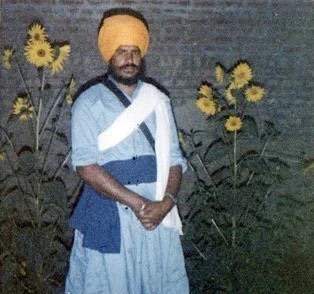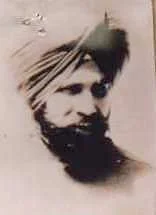Ustat Jathedaar Ji Diyan
/Shaheed Jathedar Bhai Sukhdev Singh ji Babbar’s life can only be described as an Ustat (praise) of GurSikhi (lived Sikhi).
For the Sikh that is ready to give his head and walk the Guru’s path, the Guru promises to transform the mere mortal into something that is both here and present, but at the same time out of this world.
Bhai Sukhdev Singh Ji Babbar was blessed to have been a Saathi (companion) of Shaheed Bhai Fauja Singh Ji, in the Sangat (Guru-oriented companionship) of whom, he was able to experience and live Sikhi. This experience transformed Bhai Sukhdev Singh Ji Babbar, he took Amrit (imitation into the Khalsa collective), and in giving his head to the Guru and immersing himself in Sikhi through Simran (mediation), Gurbani (Sikh practice) and SadhSangat (Guru-oriented community collective) was transformed into a Tyaar Bar Tyaar (ever-ready) Guru Ka Khalsa.
It was through this transformation that he was able to perform superhuman feats of courage and strength. He became free from the attachment to life and the fear of death that plagues the masses. In the early 1980s, when he and other Saathis formed the iconic Babbar Khalsa, he was one of a handful, out of millions of Sikhs, who pledged his life to defend the Panth, and establish Khalsa Raj.
In those early days, Bhai Sukhdev Singh Ji Babbar and his companions roamed across Panjab on foot with swords to punish enemies of the Qaum (Sikh peoples/nation). Later when the need arose to defend the pavitarta (sanctity) and Paatsahi (sovereignty) of Sri Darbar Sahib, he led the Babbar Khalsa to fight alongside Sant Jarnail Singh Bhindranwale, and the combined Khalsa faujan (army), against the full might of the invading Indian army.
On the 1st of June 1984, Bhai Sukhdev Singh Ji Babbar performed the Antim Sanskar (last rites) of Shaheed Bhai Mengha Singh Ji Babbar, the first Shaheed of the Battle of Amritsar. This was the 3rd occasion in which Bhai Sukhdev Singh Ji Babbar witnessed the brutal Shaheedi (martyrdom) of his Saathis, from Shaheed Bhai Fauja Singh Ji, his Jathedar, and the 12 Singhs martyred during the Nirankari Saka of 1978, and the Shaheedi of Bhai Kalwant Singh Ji Nagoke, who was tortured and Shaheed in 1982. Each time Bhai Sukhdev Singh Ji Babbar was faced with the brutal consequences of the path he was walking on, he was never deterred, his resolve was strengthened, and he further entrenched himself in the battlefield.
Thus, it came as a shock to the Indian State that their attempt to crush the rising voice of the Qaum, and the generation of Sikhs awoken, had failed miserably when the Khalsa met their forces head on and gave them a Mooh Thor Jawaab (a face-shattering response). Remarkably still, Bhai Sukhdev Singh Ji Babbar and the surviving members of the Babbar Khalsa regrouped following the battle and mounted a war for liberation that continues today.
When we speak of Gursikhs like Bhai Sukhdev Singh Ji Babbar, we think of their Kurbaani (sacrifice). Sikhi comes at the highest price, such is its value to Gursikhs, it demands your Dhann Mann Thann (body, mind and material resources). Putting the Kurbani of Bhai Sukhdev Singh Ji Babbar into context we must remember not only the blessed day when they attained martyrdom, but the 20 years they fought for the Azaadi of the Qaum.
A Nishaani (mark) of a Gursikh is that they are Kehni, Kathnee de Pooray (complete in words and action). When the Babbar Khalsa was formed, they pledged that they would not return to their homes, until the Raj of the Khalsa was not established, and that they would continue fighting until their last breath. After 20 years of being hunted by the Indian State and its armed forces, police, and paramilitary, living through unspeakable hardships and difficulties, away from beloved family members while they were targeted, Bhai Sukhdev Singh Babbar did not waiver.
The Indian State failed to supress and silence the roaring spirit and voice of the Azaad Khalsa, and now will never be able to. Shaheed Jathedar Bhai Sukhdev Singh Ji Babbar was a shining light leading the Qaum, and now through his Shaheedi continues to give Chanan (light) to the path ahead of us, and will do so long after the stars remain.
Vekh Shaheedee Sher Di, Tarain Roundhay Ambara'cho
Seeing the Martydom of This Lion, Even the Stars in the Sky Cried
Oh Da Khoon Pavitar, Jo Chukh Mathai Nu Layaa
The Blood of a Martyr is Pure and Worthy of Praise
Din Oh Bagan Da Jera Nau August Nau Ayaan
A Blessed Day Arrived When On The 9th Of August [He Embraced Martyrdom]





